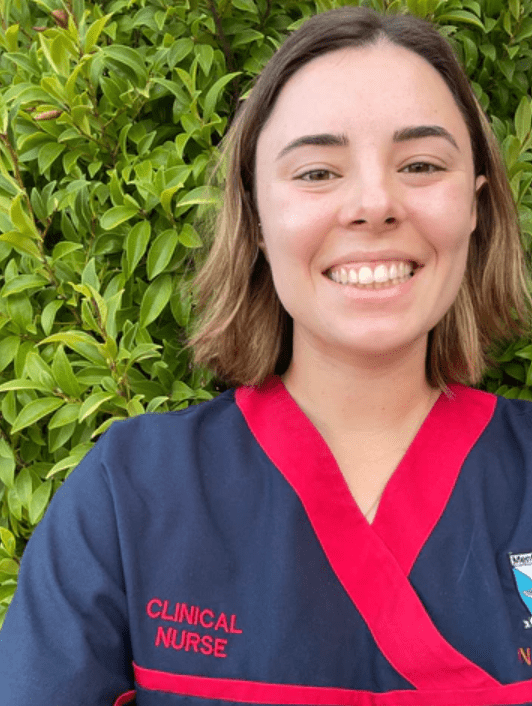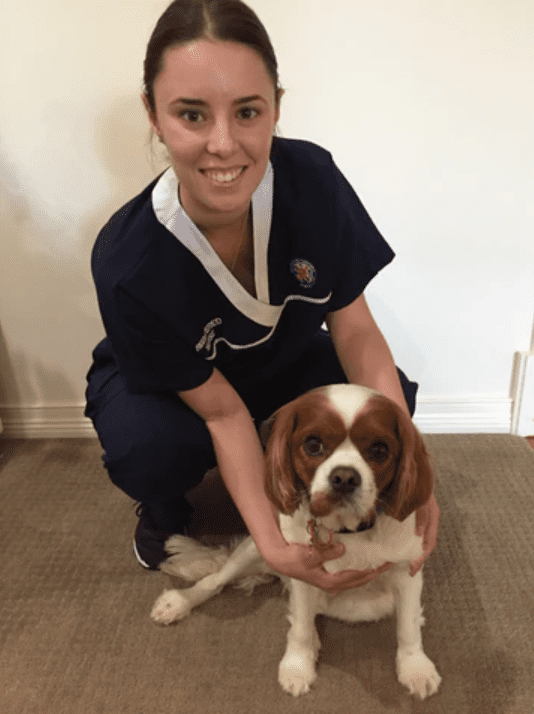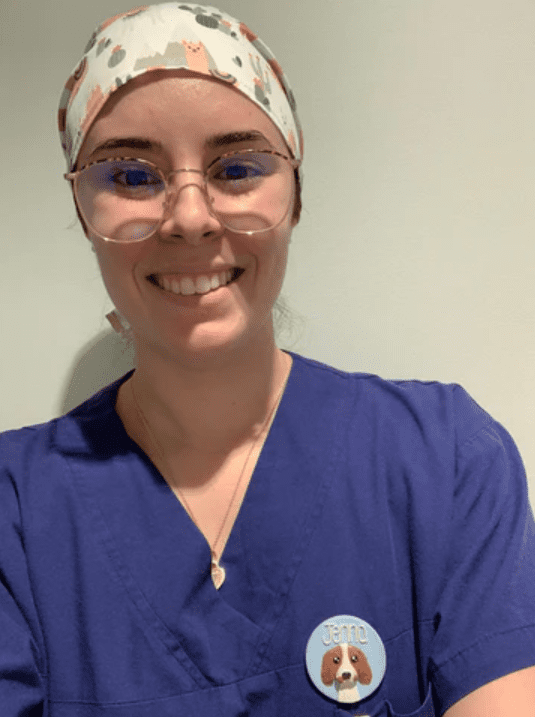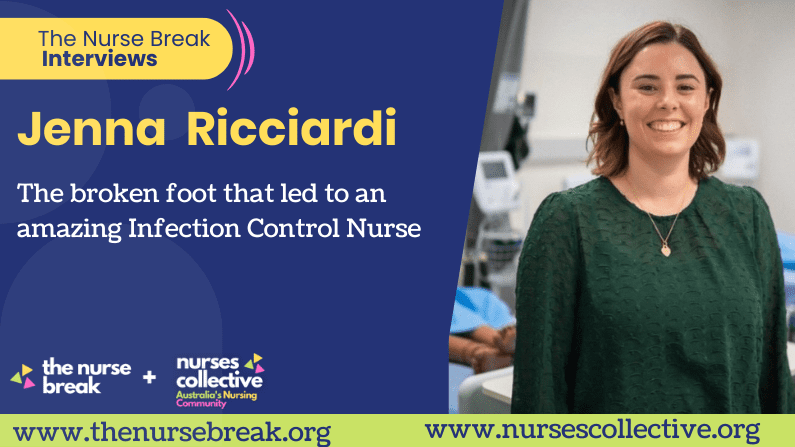Table of Contents
Jenna Ricciardi MACN graduated with a Bachelor of Nursing from The University of Notre Dame Australia in 2019 and commenced a graduate program at a major tertiary teaching hospital in 2020. She currently works full–time as an Infection control nurse. Explore Jenna’s insights, challenges, and rewarding experiences, providing a unique perspective on the dynamic field of nursing
Read more articles from nurses like Jenna here
Submit an expression of interest to write an article for us or suggest someone we should interview next
Join our Free Australian Nursing Community:
- Nursing Students, Nurses, Nurse Academics, Researchers, and Educators: Register at www.nursescollective.org Connect with like-minded nurses across Australia
Journey into nursing
I knew from a young age that I was always going to be a nurse, and commenced my nursing journey at 18 years old, straight from high school. I loved anything medical. My mum always tells the story that at 5 she took me for a blood test and I was so fascinated- she knew from that day on I was going to be a nurse!
I graduated from The University of Notre Dame (WA) in 2019 and commenced a graduate program in 2020. After a difficult graduate program during the COVID-19 pandemic, I learned that ward-based nursing was not for me.
I spent 18 months working in endoscopy nursing which ended in a workers compensation injury with a broken foot. My workers comp injury opened so many doors for me in the nursing world, allowing me to be exposed to infection control. I have been working in infection control for nearly 2 years now, recently moving to part time and picking up a role in the women and newborn emergency in Perth.



The challenging graduate year
Following graduation in 2019, I commenced a role at Sir Charles Gairdner Hospital (SCGH) in February 2020. I was so excited to start my nursing journey, but when I finally did, it was not as I expected. I commenced my career at the start of the COVID-19 pandemic, so stress and fear in the healthcare system was heightened. On a day-to-day basis, basic rules surrounding COVID and the plan for the ward/ as well as the hospital were changing. We were told it was a possibility the ward would become a covid ward and staff were not allowed to wear uniform to and from work to prevent the potential infection spread.
The first rotation of my graduate program was on the general surgical ward (specialising in upper GI and colorectal surgery). Looking back now, most of those 6 months were a blur but the thing I do remember was how I hated every minute of it.
Reality shock to the new job sunk it and a once confident student nurse, I became a fearful and anxiety-filled graduate nurse. Although there were some fantastic staff on that ward who provided support, and I was more than competent at my job, I could not get over the pressure I felt in my new role.
I think I cried every day, both to and on the way home from work. I did not enjoy working, which placed additional stress on me as I no longer wanted to take the road I set out for myself. I questioned whether nursing was even for me and considered leaving the profession altogether. The only reason I got through the first 6 months of my grad program was because my dad took me and picked me up each day.
Although at the time I hated my first 6 months, I learnt so many valuable nursing skills on gen surg, including communication/ interpersonal skills, time management (oral, IV, S/C), IV/ NG feeding, wound/ drain/ surgical site care, medication, post-surgical monitoring, recognising and responding to deterioration, etc.
Towards the end of the 6 months, I finally started to settle into the ward and not hate my life, but it was time to rotate to my next area. I completed my second rotation in a plastic dressing clinic and IV lounge, which I absolutely loved! During my 6 months, I learnt so much about wound assessment, care and healing, and PVC insertion and care.
Every day in the plastic clinic was different, we saw a number of different patients including:
Pre and post-surgical assessments, wound care (both simple and complex), hand fracture clinic, wounds referred post visit to ED, minor procedures (lesion removal, nail bed repairs).
I think the most important things I learnt from my graduate program is that you’re never going to know everything, especially in a new speciality, and that is okay! You’re not meant to know anything, as long as you can safely advocate and care for your patients. Also, senior staff and colleagues are an amazing resource and are so important during all your nursing journeys.
Surgical Specialties
Following my graduate program I knew I did not want to go back to the wards and gained employment in the endoscopy unit at SCGH. I had no previous gastro experience and therefore had no idea what to expect. I absolutely loved procedural nursing and loved the thrill you would get from banding a variceal bleed or trailing out stones during an ERCP. With over 12 months of experience in gasto I was competent in performing complex procedures, working after hours on call and facilitating student nurses.
Endoscopy nursing has wide range of nursing skills and procedures, some including:
Gastroscopy, Colonoscopy and flexible sigmoidoscopy, Endoscopic ultrasound and fine needle aspiration (FNA), ERCP, Endoscopic mucosal resection (EMR), Per oral endoscopic myotomy (POEM), Double balloon enteroscopy, Upper GI bleeding eg. oesophageal or gastric varice, Lower GI bleeding eg. chron’s, colitis, polyps and more.
The broken foot
I loved my job and was excited about the new leadership responsibilities I had gained. Unfortunately, during one busy shift when I was in a rush, I managed to fall over and break my foot. I ended up in a moon boot and required 12 weeks off work, away from the clinical area.
I was rushing around before commencing out first procedure and accidently tripped. I ignored the sore foot for about half an hour and continued working. Halfway through the colonoscopy the gastroenterologist asked me what was wrong and after I told her she sent me off for an xray. Before I knew it, I was in a moon boot and told I was not allowed to work for the next 12 weeks. At the time I was so upset, there was so much going on at work and I had just started facilitating nursing students.
I spent the next 4 weeks at home as I was not allowed in the clinical area with my moon boot on. One Monday afternoon my OSH injury management consultant rang and asked if I wanted to help with COVID contact tracing with the infection control team, starting the next day. I had no idea what it involved but thought why not!
I spent the next 5 weeks working with the infection control team, assisting with the COVID contact tracing. I gained so many awesome opportunities whilst there, ones that I would not have whilst working in gastro. To my luck, Amanda, the Coordinator of Nursing had just restructured the IPC department to employ RNs and was hiring! I decided that the IPC role was such a great opportunity, so I applied for the position and was successful. Not long after I gave my notice, I left gastro and moved to infection control permanently!
Infection Prevention and Control
Within a month of being there I got an opportunity to act as a CN and now hold a permanent CN role. I have been there for over 18 months now and have learnt more than I ever thought I would. I am so grateful that an accident lead me right to where I needed to be.
IPC nursing is a specialty aimed at preventing and controlling the spread of infectious diseases within the healthcare system using evidence-based practice. IPC nurses are not only responsible for the safety of patients, but also health professionals and visitors in the healthcare setting.
Within the tertiary hospital setting, the day-to-day functions of an IPC nurse include:
- Occupational exposure risk assessment, initial management and follow up
- Outbreak management
- COVID-19 contact tracing for staff and patients
- Pre-employment immunisation screening
- Staff vaccinations
- Influenza campaign
- Patient COVID-19 and influenza vaccination clinics
- Microbiology alerts and surveillance
- Health-associated infection investigations
- Environmental and hand hygiene audits
- Patient education
- Staff education – aseptic technique and PPE
- N95/P2 fit testing
- Policy review and development
- Building works
- Quality improvement and risk management initiatives
Although there are many functions of an IPC nurse, outbreak management and occupational exposure management are two of the most important roles that take precedence over all else.
Within my portfolio, the day commences with a daily microbiology result review for all current patients. Whilst reviewing these results, I am looking to identify abnormalities and potential infections or infectious disease. For example, patients that have a micro-resistant organism, respiratory or gastro sample, urine screening, or wounds among others.
Another key role in my day to day work is surveillance and healthcare-associated infection investigations. The use of surveillance of healthcare-associated infections (HAIs) is an important initiative to improve patient safety.
HAI surveillance is the process of gathering, studying, understanding, and sharing information about infections patients get while getting healthcare. The main aim is to ensure patient safety by monitoring and preventing infections in healthcare settings.
By closely monitoring HAIs, healthcare facilities can implement targeted interventions to reduce the risk of infections, improve patient safety, and enhance overall healthcare quality.
For example I have been involved in multiple QI projects including:
- Improving and delivering patient education about infection control/ hand hygiene to improve hygiene and reduce the risk of infections in the healthcare setting
- Improving patient hygiene to reduce the risk of UTIs
- Improving oral care to reduce the risk of healthcare-associated pneumonia
Outbreak management is a key component of infection control and often is a very difficult job. As we all know, COVID-19 has had a huge impact on the healthcare system in the past three years and continues to cause outbreaks in both the community and hospital settings.
In the infection control setting, an outbreak is defined as two or more linked cases of the same illness. When a single case arises, it can often be challenging to contain the illness and prevent it from reaching the outbreak definition. This is often because it is quite difficult to implement isolation strategies and the necessary precautions due to the complex needs of the patients. Each outbreak situation is individually assessed and risk managed appropriately to achieve optimal outcomes for the patients, whilst also focusing on their mental wellbeing.
Another huge role of an infection control nurse is to be a resource and provide support/ education to staff in the clinical area regarding infection control issues.
Most Rewarding Moments
One of the most rewarding moments in my nursing career was earlier this year when I was asked to be a speaker at the SMARTcare6 event at Notre Dame and complete a video interview.
I was selected by Notre Dame nursing staff/ students to do this event. This opportunity not only acknowledged my expertise and contributions in the nursing field but also provided me with a platform to share my knowledge, journey and experiences, contributing to the advancement of nursing care and potentially inspiring others in the field.
Interview and transcript with ND: Where are they Now – Jenna Ricciardi (vision6.com.au)
I also had an amazing opportunity to speak at the ACIPC International Conference November 2023. This talk was about the remodelling of the infection control department to allow for entry level nurses in the specialised field.
Professional Growth
Commencing my career and going on a bumpy ride, the question of “what sort of nurse do you want to be” or “what do you want to do in the future” always stressed me out because I didn’t know the answer. I still don’t know the answer and I have come to realise that is okay.
The nurse experiences I have had and the opportunities I have been given are not something I would have ever imagined. My experience was a result of being open to new experiences and putting myself out there. When asked now where I want to go in the future my answer is “wherever I get the opportunity”. It may not seem like it at the time, but every nursing workplace is valuable and no matter where you go, you will learn valuable skills that you will be able to use in the future!
I am very much an overachiever, I always work at 110% and often take on a little more than I can handle (once again thanks ADHD brain), however this has allowed me to have some amazing opportunities. I am always the first one to put my hand up for additional courses, study days and PD as I believe this allows me to gain additional knowledge and skills.
In order to continue to progress my career, I will keep putting my hand up and be open to any experience that comes my way – as I have learnt you never know what will come out of it!
Mentorship
Absolutely, I believe that mentors are so valuable, especially in the nursing setting. I have been so lucky to have a number of mentors to support me in my career. I have valued having mentors in different areas, as I believe they all have different input/ advice and invaluable support, knowledge, and encouragement. Ben, Amanda and Lishy are more informal mentors, senior nurses who have assisted me in my professional growth throughout my career.
Amy, who is my formal mentor (Amy has been mentoring me since the beginning of the ENL program) has been so invaluable! Although we are in different states in WA, she has supported me and provided me with so much guidance.
From my experience effective communication has been the most critical aspect in the mentor-mentee relationship. Effective communication is the platform to create therapeutic relationships and therefore foster a supportive relationship.
- Ben – senior lecturer at Notre Dame – Ben has assisted me from the beginning of my nursing journey!
- Amanda – coordinator of nursing infection control
- Lishy – clinical nurse specialist (my direct) and now clinical nurse manager infection control
- Amy – mentor through ACN ENL program
My advice
My nursing career is something I never would have imagined. I have had so many different opportunities and gone down paths I didn’t even know existed!
My advice to nurses who aren’t sure what they want or are not enjoying their career is…
Be open to new experiences, the nursing world is huge and there is so much out there! You will find what you love and where you are meant to be, so stick it out, especially during those most difficult days!
Other online interviews completed:






You must be logged in to post a comment.